Contemporary Business Environment: Covid-19 and Brexit Impact
VerifiedAdded on 2023/06/18
|12
|4014
|117
Report
AI Summary
This report examines the economic impacts of the Covid-19 pandemic and Brexit on the United Kingdom's contemporary business environment. It highlights the severe disruptions caused by Covid-19, including reduced income, increased unemployment, and supply chain issues, particularly affecting sectors like entertainment and hospitality. The report further details the UK government's economic responses, such as financial support for businesses and frontline workers, and the Bank of England's measures, including reduced bank rates and new financial schemes, aimed at mitigating the economic shock. Additionally, it explores the impact of Brexit on the UK economy, focusing on trade restrictions and their effect on economic growth. The report concludes by emphasizing the importance of the government's initiatives in fostering economic stability amidst these challenges.
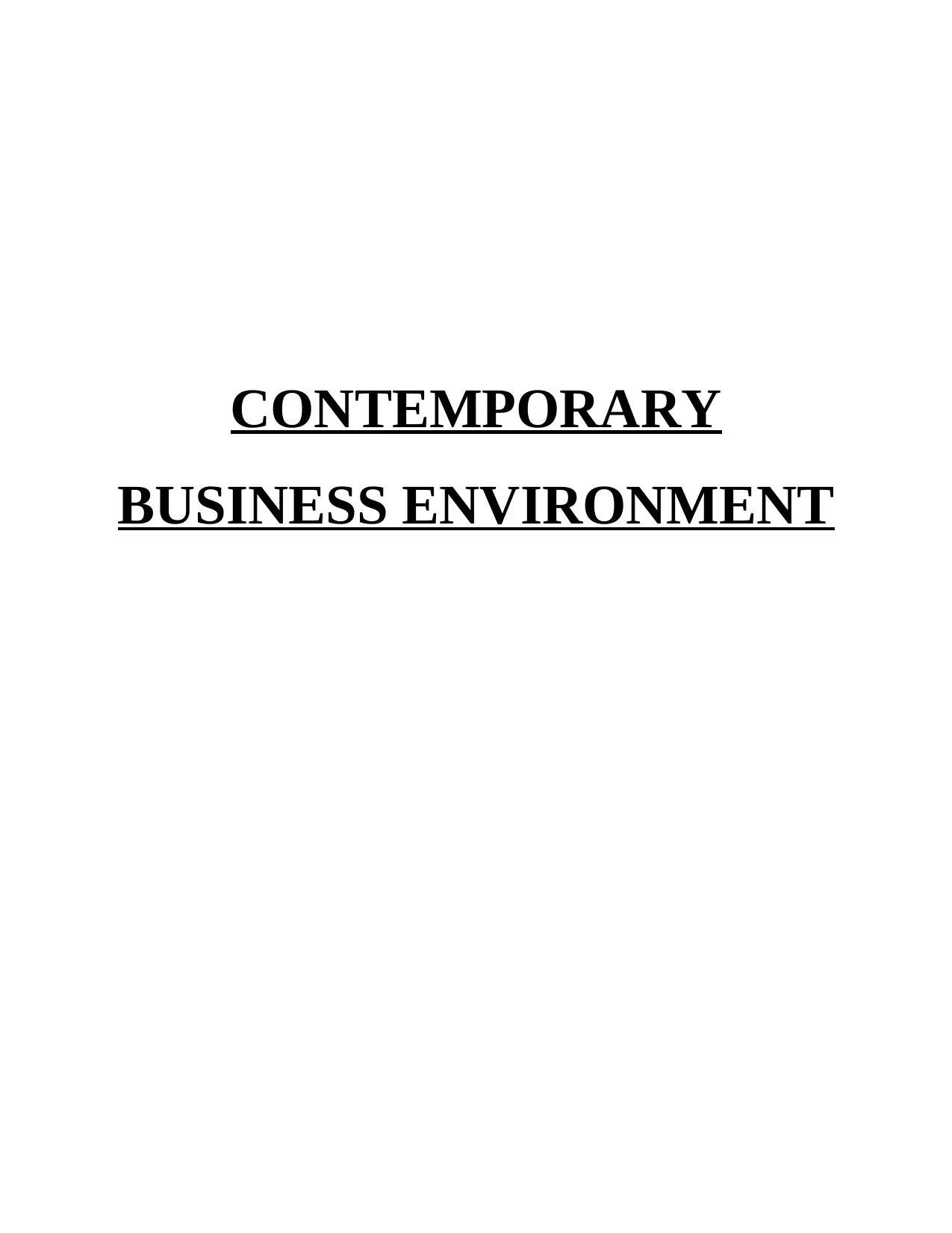
CONTEMPORARY
BUSINESS ENVIRONMENT
BUSINESS ENVIRONMENT
Paraphrase This Document
Need a fresh take? Get an instant paraphrase of this document with our AI Paraphraser
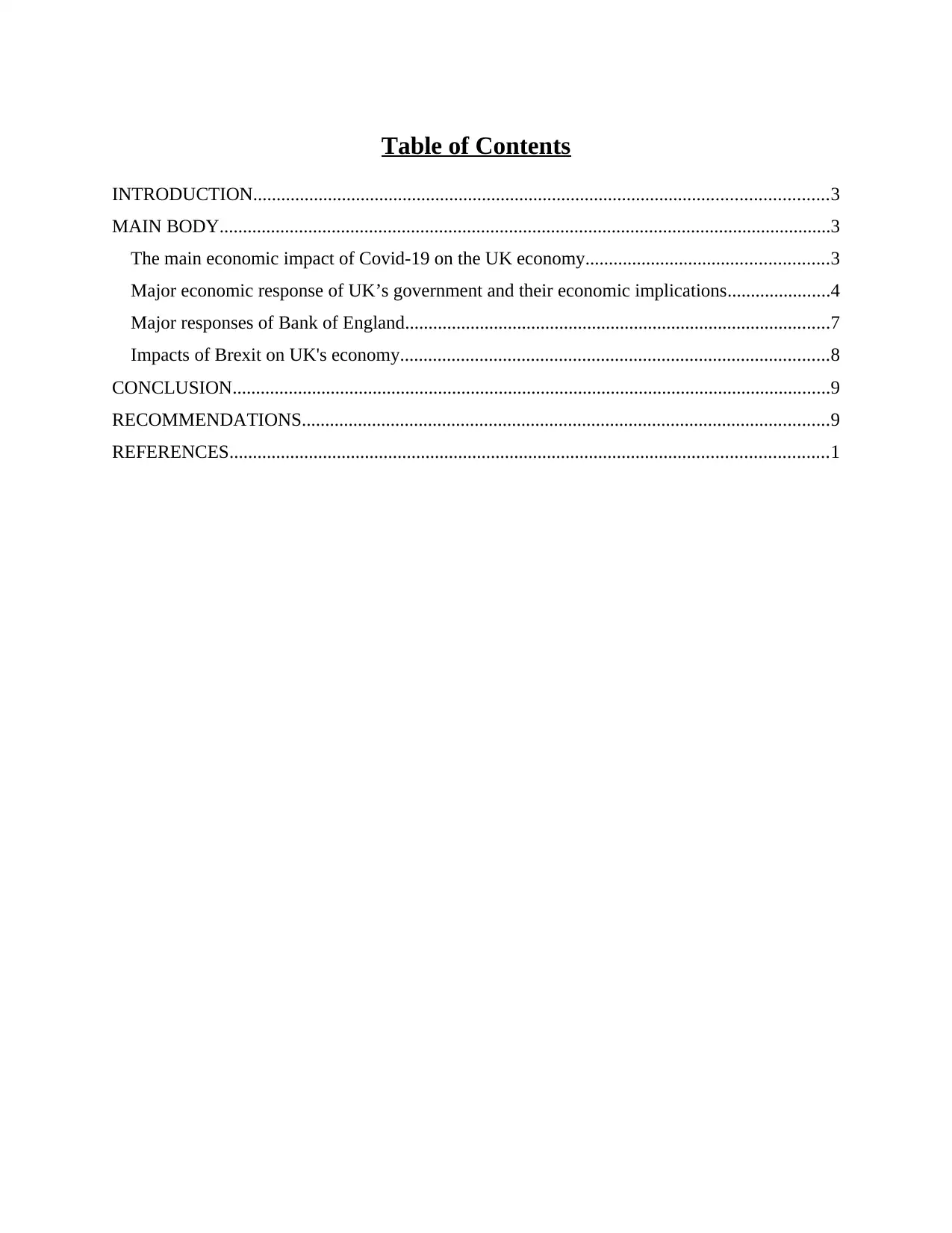
Table of Contents
INTRODUCTION...........................................................................................................................3
MAIN BODY...................................................................................................................................3
The main economic impact of Covid-19 on the UK economy....................................................3
Major economic response of UK’s government and their economic implications......................4
Major responses of Bank of England...........................................................................................7
Impacts of Brexit on UK's economy............................................................................................8
CONCLUSION................................................................................................................................9
RECOMMENDATIONS.................................................................................................................9
REFERENCES................................................................................................................................1
INTRODUCTION...........................................................................................................................3
MAIN BODY...................................................................................................................................3
The main economic impact of Covid-19 on the UK economy....................................................3
Major economic response of UK’s government and their economic implications......................4
Major responses of Bank of England...........................................................................................7
Impacts of Brexit on UK's economy............................................................................................8
CONCLUSION................................................................................................................................9
RECOMMENDATIONS.................................................................................................................9
REFERENCES................................................................................................................................1
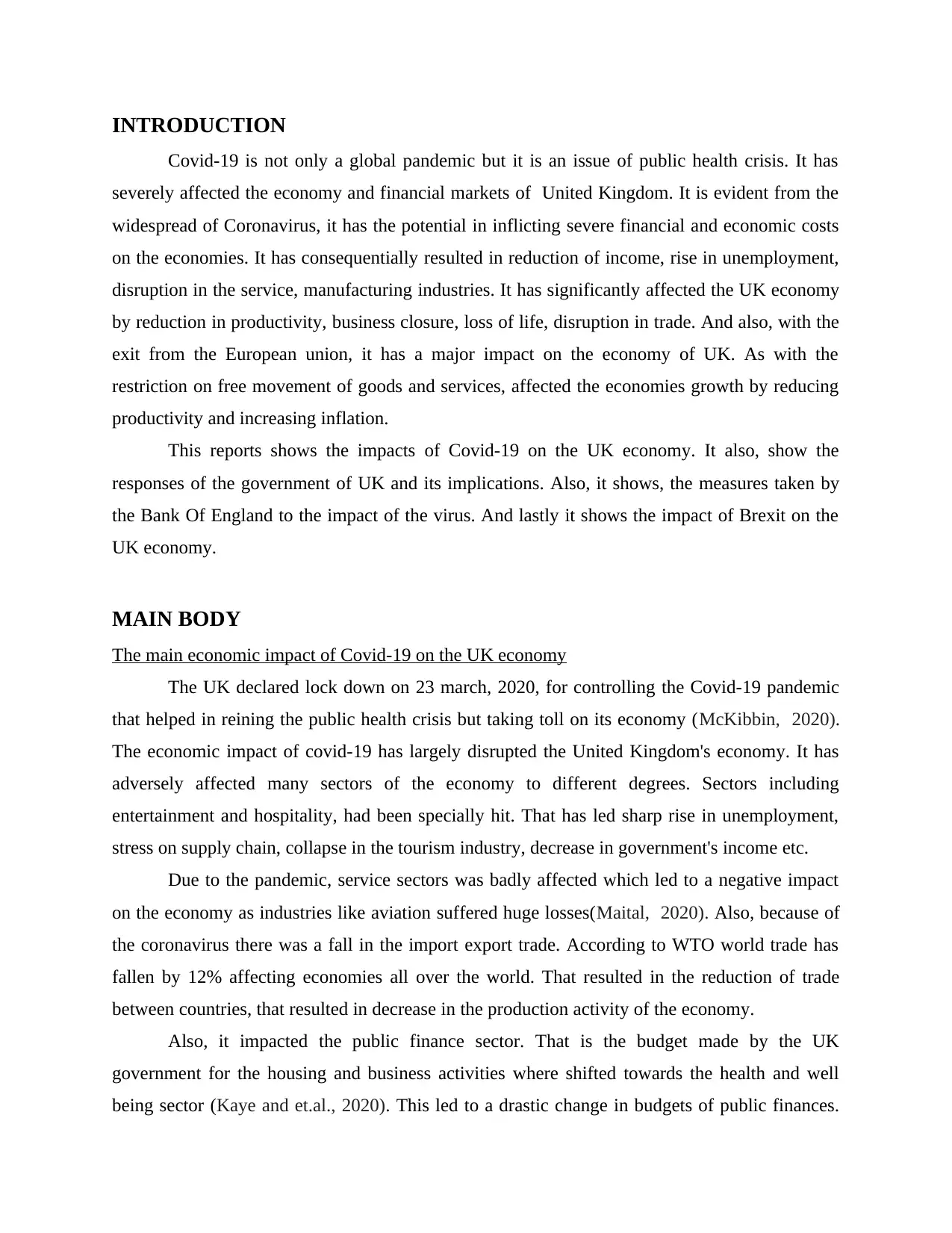
INTRODUCTION
Covid-19 is not only a global pandemic but it is an issue of public health crisis. It has
severely affected the economy and financial markets of United Kingdom. It is evident from the
widespread of Coronavirus, it has the potential in inflicting severe financial and economic costs
on the economies. It has consequentially resulted in reduction of income, rise in unemployment,
disruption in the service, manufacturing industries. It has significantly affected the UK economy
by reduction in productivity, business closure, loss of life, disruption in trade. And also, with the
exit from the European union, it has a major impact on the economy of UK. As with the
restriction on free movement of goods and services, affected the economies growth by reducing
productivity and increasing inflation.
This reports shows the impacts of Covid-19 on the UK economy. It also, show the
responses of the government of UK and its implications. Also, it shows, the measures taken by
the Bank Of England to the impact of the virus. And lastly it shows the impact of Brexit on the
UK economy.
MAIN BODY
The main economic impact of Covid-19 on the UK economy
The UK declared lock down on 23 march, 2020, for controlling the Covid-19 pandemic
that helped in reining the public health crisis but taking toll on its economy (McKibbin, 2020).
The economic impact of covid-19 has largely disrupted the United Kingdom's economy. It has
adversely affected many sectors of the economy to different degrees. Sectors including
entertainment and hospitality, had been specially hit. That has led sharp rise in unemployment,
stress on supply chain, collapse in the tourism industry, decrease in government's income etc.
Due to the pandemic, service sectors was badly affected which led to a negative impact
on the economy as industries like aviation suffered huge losses(Maital, 2020). Also, because of
the coronavirus there was a fall in the import export trade. According to WTO world trade has
fallen by 12% affecting economies all over the world. That resulted in the reduction of trade
between countries, that resulted in decrease in the production activity of the economy.
Also, it impacted the public finance sector. That is the budget made by the UK
government for the housing and business activities where shifted towards the health and well
being sector (Kaye and et.al., 2020). This led to a drastic change in budgets of public finances.
Covid-19 is not only a global pandemic but it is an issue of public health crisis. It has
severely affected the economy and financial markets of United Kingdom. It is evident from the
widespread of Coronavirus, it has the potential in inflicting severe financial and economic costs
on the economies. It has consequentially resulted in reduction of income, rise in unemployment,
disruption in the service, manufacturing industries. It has significantly affected the UK economy
by reduction in productivity, business closure, loss of life, disruption in trade. And also, with the
exit from the European union, it has a major impact on the economy of UK. As with the
restriction on free movement of goods and services, affected the economies growth by reducing
productivity and increasing inflation.
This reports shows the impacts of Covid-19 on the UK economy. It also, show the
responses of the government of UK and its implications. Also, it shows, the measures taken by
the Bank Of England to the impact of the virus. And lastly it shows the impact of Brexit on the
UK economy.
MAIN BODY
The main economic impact of Covid-19 on the UK economy
The UK declared lock down on 23 march, 2020, for controlling the Covid-19 pandemic
that helped in reining the public health crisis but taking toll on its economy (McKibbin, 2020).
The economic impact of covid-19 has largely disrupted the United Kingdom's economy. It has
adversely affected many sectors of the economy to different degrees. Sectors including
entertainment and hospitality, had been specially hit. That has led sharp rise in unemployment,
stress on supply chain, collapse in the tourism industry, decrease in government's income etc.
Due to the pandemic, service sectors was badly affected which led to a negative impact
on the economy as industries like aviation suffered huge losses(Maital, 2020). Also, because of
the coronavirus there was a fall in the import export trade. According to WTO world trade has
fallen by 12% affecting economies all over the world. That resulted in the reduction of trade
between countries, that resulted in decrease in the production activity of the economy.
Also, it impacted the public finance sector. That is the budget made by the UK
government for the housing and business activities where shifted towards the health and well
being sector (Kaye and et.al., 2020). This led to a drastic change in budgets of public finances.
⊘ This is a preview!⊘
Do you want full access?
Subscribe today to unlock all pages.

Trusted by 1+ million students worldwide
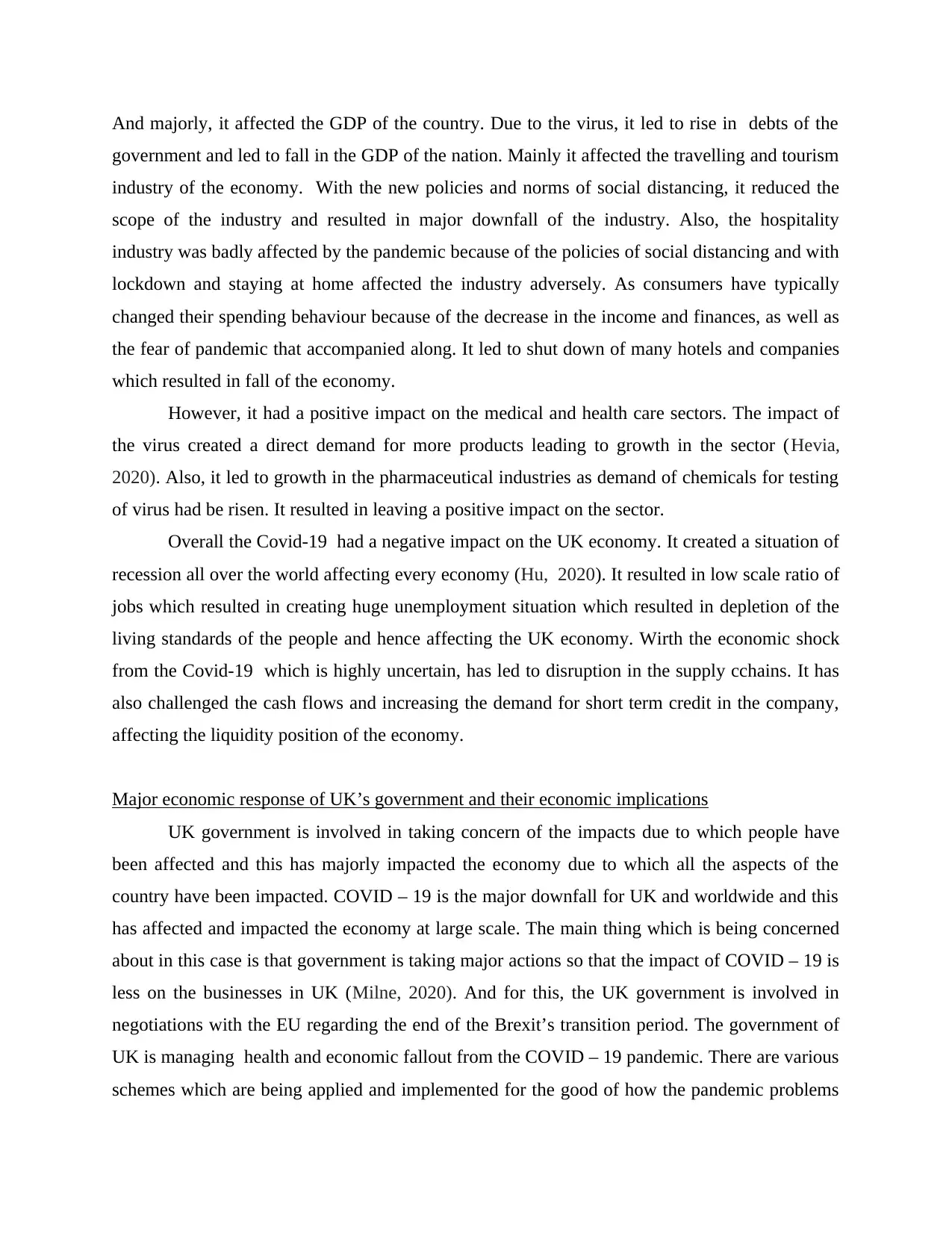
And majorly, it affected the GDP of the country. Due to the virus, it led to rise in debts of the
government and led to fall in the GDP of the nation. Mainly it affected the travelling and tourism
industry of the economy. With the new policies and norms of social distancing, it reduced the
scope of the industry and resulted in major downfall of the industry. Also, the hospitality
industry was badly affected by the pandemic because of the policies of social distancing and with
lockdown and staying at home affected the industry adversely. As consumers have typically
changed their spending behaviour because of the decrease in the income and finances, as well as
the fear of pandemic that accompanied along. It led to shut down of many hotels and companies
which resulted in fall of the economy.
However, it had a positive impact on the medical and health care sectors. The impact of
the virus created a direct demand for more products leading to growth in the sector (Hevia,
2020). Also, it led to growth in the pharmaceutical industries as demand of chemicals for testing
of virus had be risen. It resulted in leaving a positive impact on the sector.
Overall the Covid-19 had a negative impact on the UK economy. It created a situation of
recession all over the world affecting every economy (Hu, 2020). It resulted in low scale ratio of
jobs which resulted in creating huge unemployment situation which resulted in depletion of the
living standards of the people and hence affecting the UK economy. Wirth the economic shock
from the Covid-19 which is highly uncertain, has led to disruption in the supply cchains. It has
also challenged the cash flows and increasing the demand for short term credit in the company,
affecting the liquidity position of the economy.
Major economic response of UK’s government and their economic implications
UK government is involved in taking concern of the impacts due to which people have
been affected and this has majorly impacted the economy due to which all the aspects of the
country have been impacted. COVID – 19 is the major downfall for UK and worldwide and this
has affected and impacted the economy at large scale. The main thing which is being concerned
about in this case is that government is taking major actions so that the impact of COVID – 19 is
less on the businesses in UK (Milne, 2020). And for this, the UK government is involved in
negotiations with the EU regarding the end of the Brexit’s transition period. The government of
UK is managing health and economic fallout from the COVID – 19 pandemic. There are various
schemes which are being applied and implemented for the good of how the pandemic problems
government and led to fall in the GDP of the nation. Mainly it affected the travelling and tourism
industry of the economy. With the new policies and norms of social distancing, it reduced the
scope of the industry and resulted in major downfall of the industry. Also, the hospitality
industry was badly affected by the pandemic because of the policies of social distancing and with
lockdown and staying at home affected the industry adversely. As consumers have typically
changed their spending behaviour because of the decrease in the income and finances, as well as
the fear of pandemic that accompanied along. It led to shut down of many hotels and companies
which resulted in fall of the economy.
However, it had a positive impact on the medical and health care sectors. The impact of
the virus created a direct demand for more products leading to growth in the sector (Hevia,
2020). Also, it led to growth in the pharmaceutical industries as demand of chemicals for testing
of virus had be risen. It resulted in leaving a positive impact on the sector.
Overall the Covid-19 had a negative impact on the UK economy. It created a situation of
recession all over the world affecting every economy (Hu, 2020). It resulted in low scale ratio of
jobs which resulted in creating huge unemployment situation which resulted in depletion of the
living standards of the people and hence affecting the UK economy. Wirth the economic shock
from the Covid-19 which is highly uncertain, has led to disruption in the supply cchains. It has
also challenged the cash flows and increasing the demand for short term credit in the company,
affecting the liquidity position of the economy.
Major economic response of UK’s government and their economic implications
UK government is involved in taking concern of the impacts due to which people have
been affected and this has majorly impacted the economy due to which all the aspects of the
country have been impacted. COVID – 19 is the major downfall for UK and worldwide and this
has affected and impacted the economy at large scale. The main thing which is being concerned
about in this case is that government is taking major actions so that the impact of COVID – 19 is
less on the businesses in UK (Milne, 2020). And for this, the UK government is involved in
negotiations with the EU regarding the end of the Brexit’s transition period. The government of
UK is managing health and economic fallout from the COVID – 19 pandemic. There are various
schemes which are being applied and implemented for the good of how the pandemic problems
Paraphrase This Document
Need a fresh take? Get an instant paraphrase of this document with our AI Paraphraser
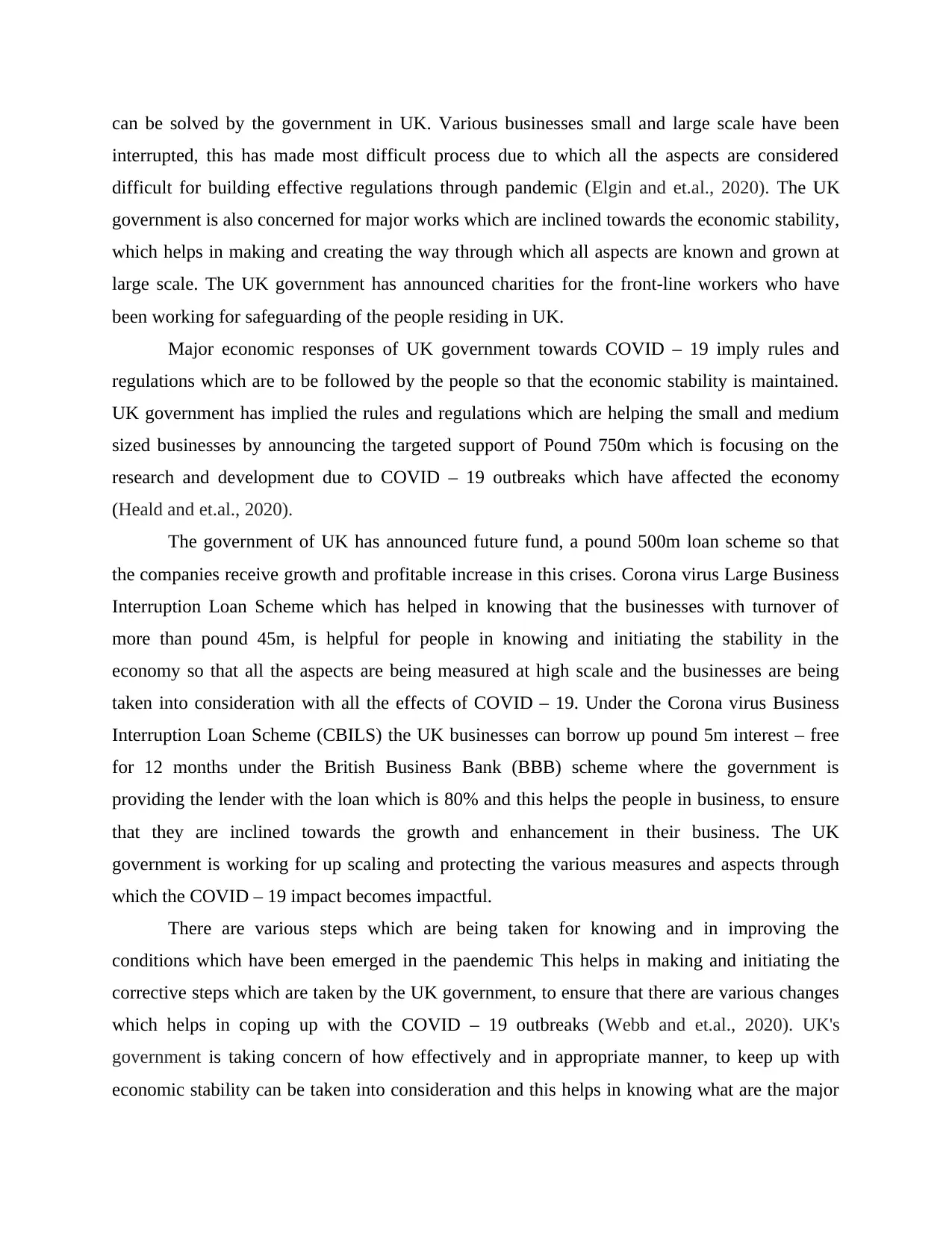
can be solved by the government in UK. Various businesses small and large scale have been
interrupted, this has made most difficult process due to which all the aspects are considered
difficult for building effective regulations through pandemic (Elgin and et.al., 2020). The UK
government is also concerned for major works which are inclined towards the economic stability,
which helps in making and creating the way through which all aspects are known and grown at
large scale. The UK government has announced charities for the front-line workers who have
been working for safeguarding of the people residing in UK.
Major economic responses of UK government towards COVID – 19 imply rules and
regulations which are to be followed by the people so that the economic stability is maintained.
UK government has implied the rules and regulations which are helping the small and medium
sized businesses by announcing the targeted support of Pound 750m which is focusing on the
research and development due to COVID – 19 outbreaks which have affected the economy
(Heald and et.al., 2020).
The government of UK has announced future fund, a pound 500m loan scheme so that
the companies receive growth and profitable increase in this crises. Corona virus Large Business
Interruption Loan Scheme which has helped in knowing that the businesses with turnover of
more than pound 45m, is helpful for people in knowing and initiating the stability in the
economy so that all the aspects are being measured at high scale and the businesses are being
taken into consideration with all the effects of COVID – 19. Under the Corona virus Business
Interruption Loan Scheme (CBILS) the UK businesses can borrow up pound 5m interest – free
for 12 months under the British Business Bank (BBB) scheme where the government is
providing the lender with the loan which is 80% and this helps the people in business, to ensure
that they are inclined towards the growth and enhancement in their business. The UK
government is working for up scaling and protecting the various measures and aspects through
which the COVID – 19 impact becomes impactful.
There are various steps which are being taken for knowing and in improving the
conditions which have been emerged in the paendemic This helps in making and initiating the
corrective steps which are taken by the UK government, to ensure that there are various changes
which helps in coping up with the COVID – 19 outbreaks (Webb and et.al., 2020). UK's
government is taking concern of how effectively and in appropriate manner, to keep up with
economic stability can be taken into consideration and this helps in knowing what are the major
interrupted, this has made most difficult process due to which all the aspects are considered
difficult for building effective regulations through pandemic (Elgin and et.al., 2020). The UK
government is also concerned for major works which are inclined towards the economic stability,
which helps in making and creating the way through which all aspects are known and grown at
large scale. The UK government has announced charities for the front-line workers who have
been working for safeguarding of the people residing in UK.
Major economic responses of UK government towards COVID – 19 imply rules and
regulations which are to be followed by the people so that the economic stability is maintained.
UK government has implied the rules and regulations which are helping the small and medium
sized businesses by announcing the targeted support of Pound 750m which is focusing on the
research and development due to COVID – 19 outbreaks which have affected the economy
(Heald and et.al., 2020).
The government of UK has announced future fund, a pound 500m loan scheme so that
the companies receive growth and profitable increase in this crises. Corona virus Large Business
Interruption Loan Scheme which has helped in knowing that the businesses with turnover of
more than pound 45m, is helpful for people in knowing and initiating the stability in the
economy so that all the aspects are being measured at high scale and the businesses are being
taken into consideration with all the effects of COVID – 19. Under the Corona virus Business
Interruption Loan Scheme (CBILS) the UK businesses can borrow up pound 5m interest – free
for 12 months under the British Business Bank (BBB) scheme where the government is
providing the lender with the loan which is 80% and this helps the people in business, to ensure
that they are inclined towards the growth and enhancement in their business. The UK
government is working for up scaling and protecting the various measures and aspects through
which the COVID – 19 impact becomes impactful.
There are various steps which are being taken for knowing and in improving the
conditions which have been emerged in the paendemic This helps in making and initiating the
corrective steps which are taken by the UK government, to ensure that there are various changes
which helps in coping up with the COVID – 19 outbreaks (Webb and et.al., 2020). UK's
government is taking concern of how effectively and in appropriate manner, to keep up with
economic stability can be taken into consideration and this helps in knowing what are the major
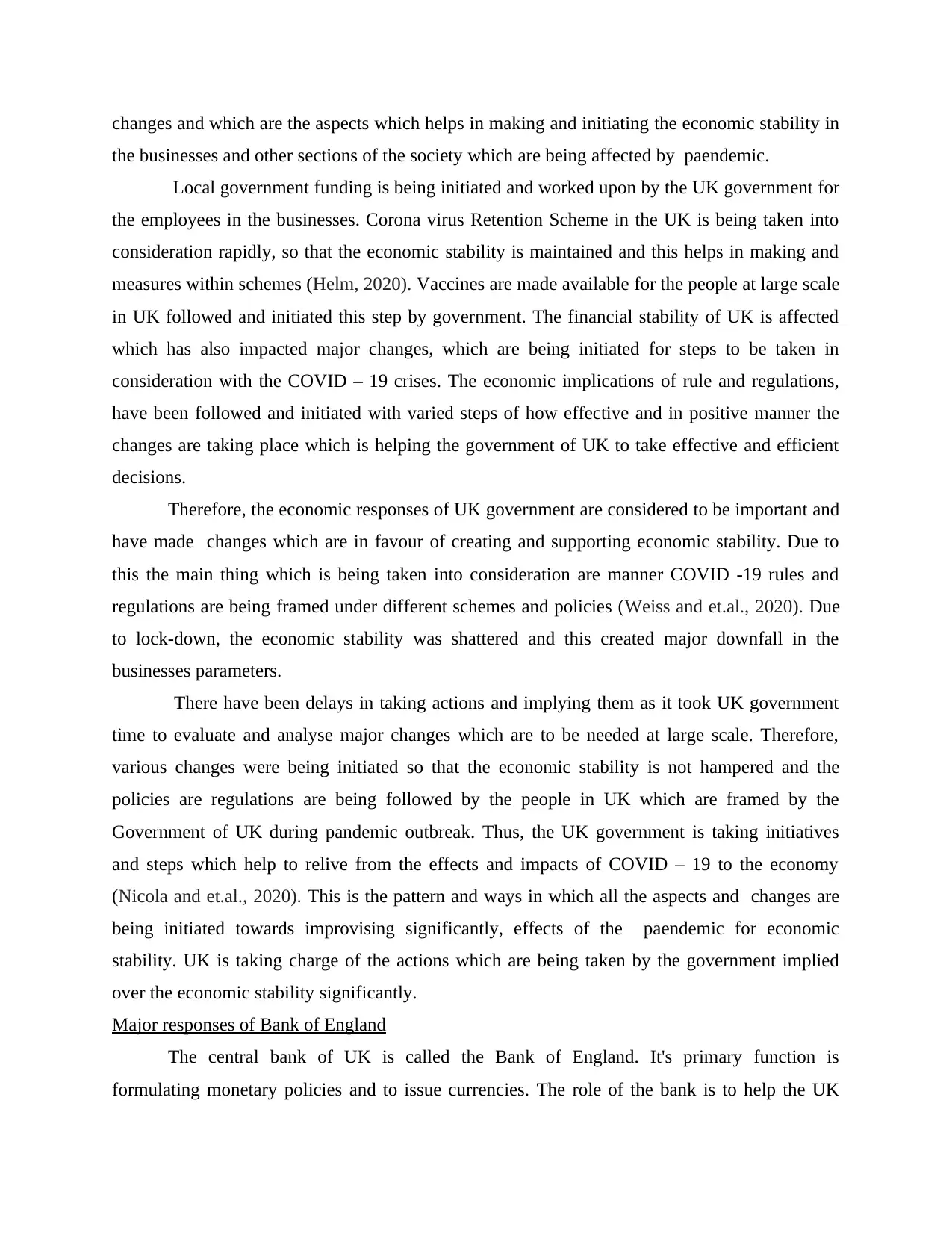
changes and which are the aspects which helps in making and initiating the economic stability in
the businesses and other sections of the society which are being affected by paendemic.
Local government funding is being initiated and worked upon by the UK government for
the employees in the businesses. Corona virus Retention Scheme in the UK is being taken into
consideration rapidly, so that the economic stability is maintained and this helps in making and
measures within schemes (Helm, 2020). Vaccines are made available for the people at large scale
in UK followed and initiated this step by government. The financial stability of UK is affected
which has also impacted major changes, which are being initiated for steps to be taken in
consideration with the COVID – 19 crises. The economic implications of rule and regulations,
have been followed and initiated with varied steps of how effective and in positive manner the
changes are taking place which is helping the government of UK to take effective and efficient
decisions.
Therefore, the economic responses of UK government are considered to be important and
have made changes which are in favour of creating and supporting economic stability. Due to
this the main thing which is being taken into consideration are manner COVID -19 rules and
regulations are being framed under different schemes and policies (Weiss and et.al., 2020). Due
to lock-down, the economic stability was shattered and this created major downfall in the
businesses parameters.
There have been delays in taking actions and implying them as it took UK government
time to evaluate and analyse major changes which are to be needed at large scale. Therefore,
various changes were being initiated so that the economic stability is not hampered and the
policies are regulations are being followed by the people in UK which are framed by the
Government of UK during pandemic outbreak. Thus, the UK government is taking initiatives
and steps which help to relive from the effects and impacts of COVID – 19 to the economy
(Nicola and et.al., 2020). This is the pattern and ways in which all the aspects and changes are
being initiated towards improvising significantly, effects of the paendemic for economic
stability. UK is taking charge of the actions which are being taken by the government implied
over the economic stability significantly.
Major responses of Bank of England
The central bank of UK is called the Bank of England. It's primary function is
formulating monetary policies and to issue currencies. The role of the bank is to help the UK
the businesses and other sections of the society which are being affected by paendemic.
Local government funding is being initiated and worked upon by the UK government for
the employees in the businesses. Corona virus Retention Scheme in the UK is being taken into
consideration rapidly, so that the economic stability is maintained and this helps in making and
measures within schemes (Helm, 2020). Vaccines are made available for the people at large scale
in UK followed and initiated this step by government. The financial stability of UK is affected
which has also impacted major changes, which are being initiated for steps to be taken in
consideration with the COVID – 19 crises. The economic implications of rule and regulations,
have been followed and initiated with varied steps of how effective and in positive manner the
changes are taking place which is helping the government of UK to take effective and efficient
decisions.
Therefore, the economic responses of UK government are considered to be important and
have made changes which are in favour of creating and supporting economic stability. Due to
this the main thing which is being taken into consideration are manner COVID -19 rules and
regulations are being framed under different schemes and policies (Weiss and et.al., 2020). Due
to lock-down, the economic stability was shattered and this created major downfall in the
businesses parameters.
There have been delays in taking actions and implying them as it took UK government
time to evaluate and analyse major changes which are to be needed at large scale. Therefore,
various changes were being initiated so that the economic stability is not hampered and the
policies are regulations are being followed by the people in UK which are framed by the
Government of UK during pandemic outbreak. Thus, the UK government is taking initiatives
and steps which help to relive from the effects and impacts of COVID – 19 to the economy
(Nicola and et.al., 2020). This is the pattern and ways in which all the aspects and changes are
being initiated towards improvising significantly, effects of the paendemic for economic
stability. UK is taking charge of the actions which are being taken by the government implied
over the economic stability significantly.
Major responses of Bank of England
The central bank of UK is called the Bank of England. It's primary function is
formulating monetary policies and to issue currencies. The role of the bank is to help the UK
⊘ This is a preview!⊘
Do you want full access?
Subscribe today to unlock all pages.

Trusted by 1+ million students worldwide
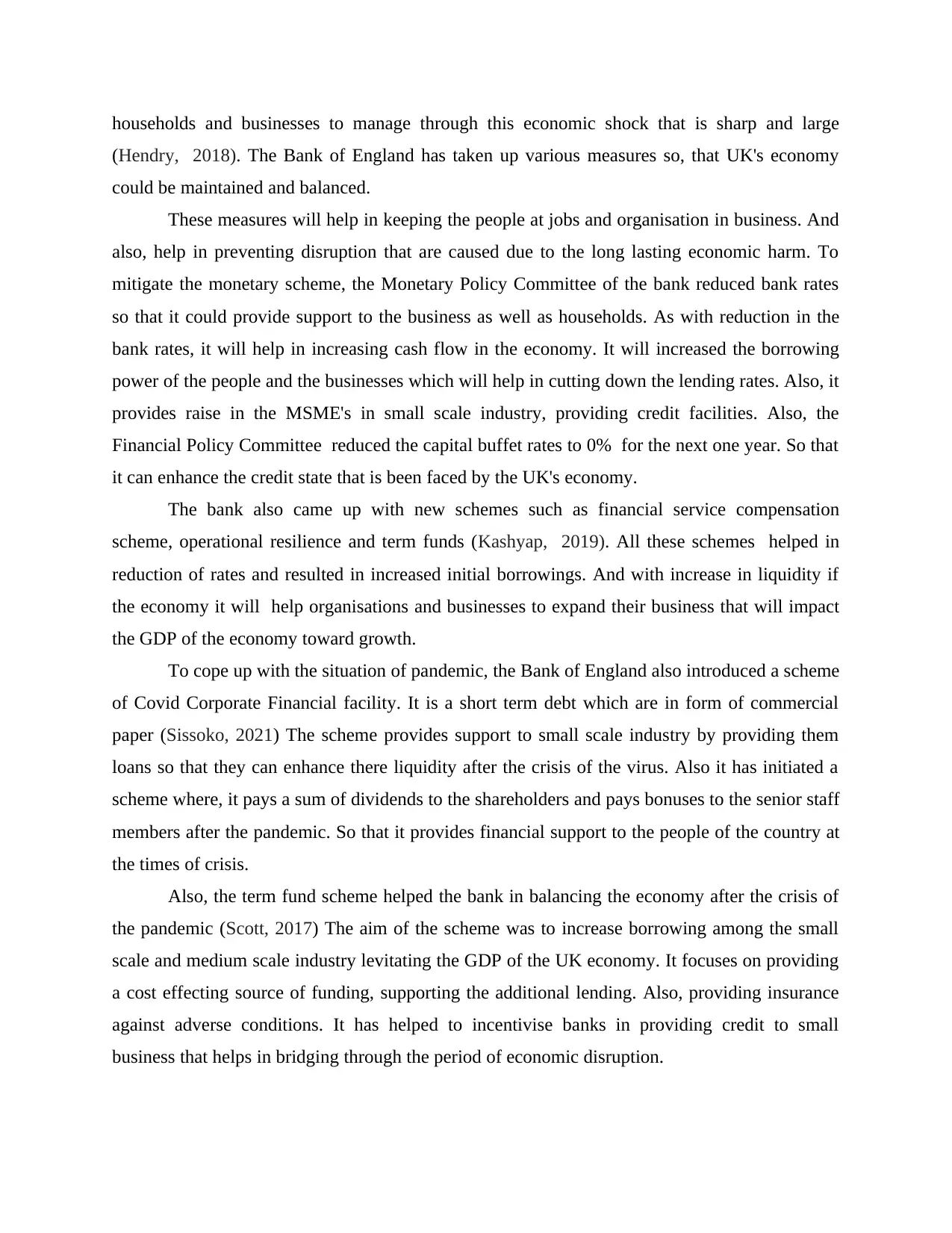
households and businesses to manage through this economic shock that is sharp and large
(Hendry, 2018). The Bank of England has taken up various measures so, that UK's economy
could be maintained and balanced.
These measures will help in keeping the people at jobs and organisation in business. And
also, help in preventing disruption that are caused due to the long lasting economic harm. To
mitigate the monetary scheme, the Monetary Policy Committee of the bank reduced bank rates
so that it could provide support to the business as well as households. As with reduction in the
bank rates, it will help in increasing cash flow in the economy. It will increased the borrowing
power of the people and the businesses which will help in cutting down the lending rates. Also, it
provides raise in the MSME's in small scale industry, providing credit facilities. Also, the
Financial Policy Committee reduced the capital buffet rates to 0% for the next one year. So that
it can enhance the credit state that is been faced by the UK's economy.
The bank also came up with new schemes such as financial service compensation
scheme, operational resilience and term funds (Kashyap, 2019). All these schemes helped in
reduction of rates and resulted in increased initial borrowings. And with increase in liquidity if
the economy it will help organisations and businesses to expand their business that will impact
the GDP of the economy toward growth.
To cope up with the situation of pandemic, the Bank of England also introduced a scheme
of Covid Corporate Financial facility. It is a short term debt which are in form of commercial
paper (Sissoko, 2021) The scheme provides support to small scale industry by providing them
loans so that they can enhance there liquidity after the crisis of the virus. Also it has initiated a
scheme where, it pays a sum of dividends to the shareholders and pays bonuses to the senior staff
members after the pandemic. So that it provides financial support to the people of the country at
the times of crisis.
Also, the term fund scheme helped the bank in balancing the economy after the crisis of
the pandemic (Scott, 2017) The aim of the scheme was to increase borrowing among the small
scale and medium scale industry levitating the GDP of the UK economy. It focuses on providing
a cost effecting source of funding, supporting the additional lending. Also, providing insurance
against adverse conditions. It has helped to incentivise banks in providing credit to small
business that helps in bridging through the period of economic disruption.
(Hendry, 2018). The Bank of England has taken up various measures so, that UK's economy
could be maintained and balanced.
These measures will help in keeping the people at jobs and organisation in business. And
also, help in preventing disruption that are caused due to the long lasting economic harm. To
mitigate the monetary scheme, the Monetary Policy Committee of the bank reduced bank rates
so that it could provide support to the business as well as households. As with reduction in the
bank rates, it will help in increasing cash flow in the economy. It will increased the borrowing
power of the people and the businesses which will help in cutting down the lending rates. Also, it
provides raise in the MSME's in small scale industry, providing credit facilities. Also, the
Financial Policy Committee reduced the capital buffet rates to 0% for the next one year. So that
it can enhance the credit state that is been faced by the UK's economy.
The bank also came up with new schemes such as financial service compensation
scheme, operational resilience and term funds (Kashyap, 2019). All these schemes helped in
reduction of rates and resulted in increased initial borrowings. And with increase in liquidity if
the economy it will help organisations and businesses to expand their business that will impact
the GDP of the economy toward growth.
To cope up with the situation of pandemic, the Bank of England also introduced a scheme
of Covid Corporate Financial facility. It is a short term debt which are in form of commercial
paper (Sissoko, 2021) The scheme provides support to small scale industry by providing them
loans so that they can enhance there liquidity after the crisis of the virus. Also it has initiated a
scheme where, it pays a sum of dividends to the shareholders and pays bonuses to the senior staff
members after the pandemic. So that it provides financial support to the people of the country at
the times of crisis.
Also, the term fund scheme helped the bank in balancing the economy after the crisis of
the pandemic (Scott, 2017) The aim of the scheme was to increase borrowing among the small
scale and medium scale industry levitating the GDP of the UK economy. It focuses on providing
a cost effecting source of funding, supporting the additional lending. Also, providing insurance
against adverse conditions. It has helped to incentivise banks in providing credit to small
business that helps in bridging through the period of economic disruption.
Paraphrase This Document
Need a fresh take? Get an instant paraphrase of this document with our AI Paraphraser
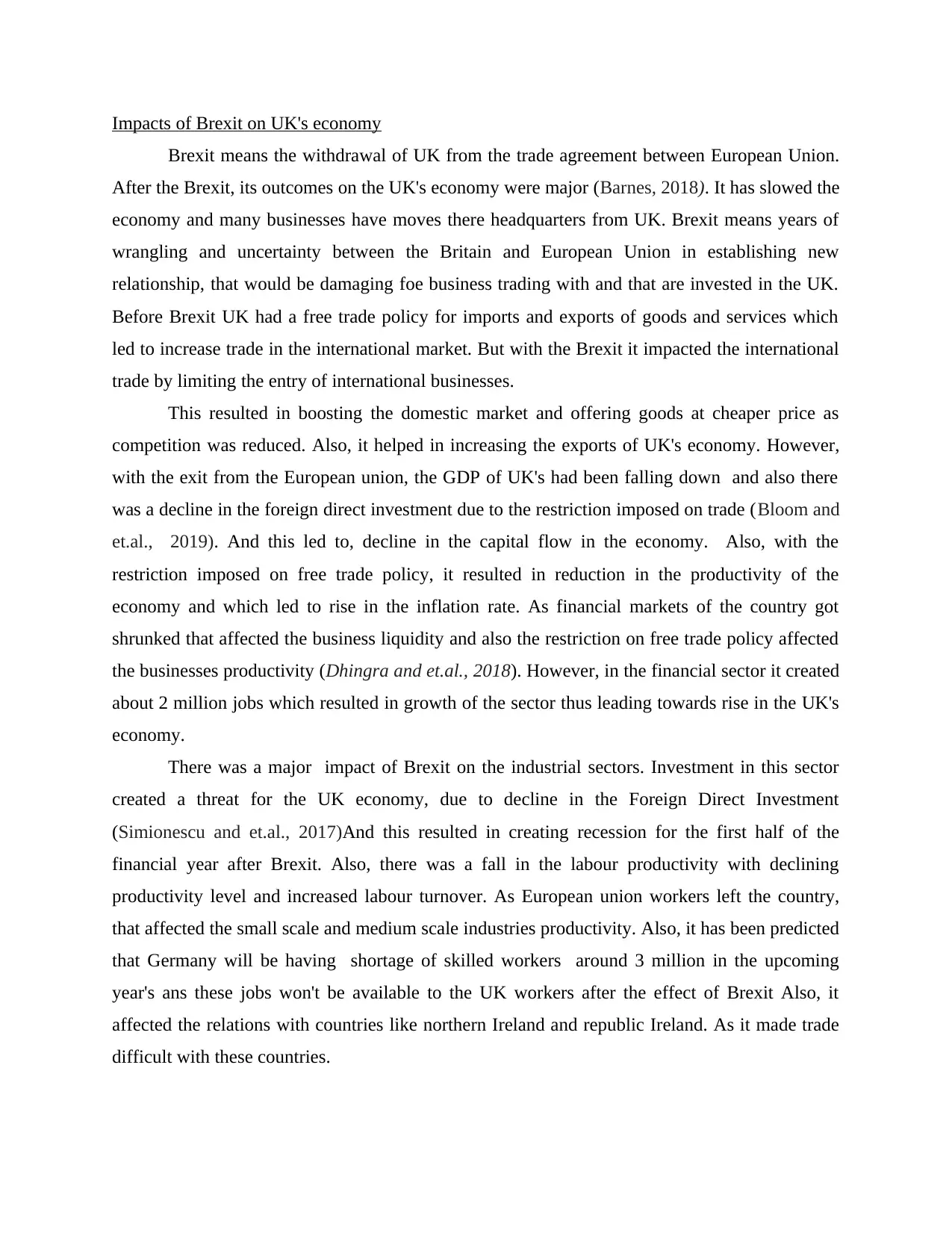
Impacts of Brexit on UK's economy
Brexit means the withdrawal of UK from the trade agreement between European Union.
After the Brexit, its outcomes on the UK's economy were major (Barnes, 2018). It has slowed the
economy and many businesses have moves there headquarters from UK. Brexit means years of
wrangling and uncertainty between the Britain and European Union in establishing new
relationship, that would be damaging foe business trading with and that are invested in the UK.
Before Brexit UK had a free trade policy for imports and exports of goods and services which
led to increase trade in the international market. But with the Brexit it impacted the international
trade by limiting the entry of international businesses.
This resulted in boosting the domestic market and offering goods at cheaper price as
competition was reduced. Also, it helped in increasing the exports of UK's economy. However,
with the exit from the European union, the GDP of UK's had been falling down and also there
was a decline in the foreign direct investment due to the restriction imposed on trade (Bloom and
et.al., 2019). And this led to, decline in the capital flow in the economy. Also, with the
restriction imposed on free trade policy, it resulted in reduction in the productivity of the
economy and which led to rise in the inflation rate. As financial markets of the country got
shrunked that affected the business liquidity and also the restriction on free trade policy affected
the businesses productivity (Dhingra and et.al., 2018). However, in the financial sector it created
about 2 million jobs which resulted in growth of the sector thus leading towards rise in the UK's
economy.
There was a major impact of Brexit on the industrial sectors. Investment in this sector
created a threat for the UK economy, due to decline in the Foreign Direct Investment
(Simionescu and et.al., 2017)And this resulted in creating recession for the first half of the
financial year after Brexit. Also, there was a fall in the labour productivity with declining
productivity level and increased labour turnover. As European union workers left the country,
that affected the small scale and medium scale industries productivity. Also, it has been predicted
that Germany will be having shortage of skilled workers around 3 million in the upcoming
year's ans these jobs won't be available to the UK workers after the effect of Brexit Also, it
affected the relations with countries like northern Ireland and republic Ireland. As it made trade
difficult with these countries.
Brexit means the withdrawal of UK from the trade agreement between European Union.
After the Brexit, its outcomes on the UK's economy were major (Barnes, 2018). It has slowed the
economy and many businesses have moves there headquarters from UK. Brexit means years of
wrangling and uncertainty between the Britain and European Union in establishing new
relationship, that would be damaging foe business trading with and that are invested in the UK.
Before Brexit UK had a free trade policy for imports and exports of goods and services which
led to increase trade in the international market. But with the Brexit it impacted the international
trade by limiting the entry of international businesses.
This resulted in boosting the domestic market and offering goods at cheaper price as
competition was reduced. Also, it helped in increasing the exports of UK's economy. However,
with the exit from the European union, the GDP of UK's had been falling down and also there
was a decline in the foreign direct investment due to the restriction imposed on trade (Bloom and
et.al., 2019). And this led to, decline in the capital flow in the economy. Also, with the
restriction imposed on free trade policy, it resulted in reduction in the productivity of the
economy and which led to rise in the inflation rate. As financial markets of the country got
shrunked that affected the business liquidity and also the restriction on free trade policy affected
the businesses productivity (Dhingra and et.al., 2018). However, in the financial sector it created
about 2 million jobs which resulted in growth of the sector thus leading towards rise in the UK's
economy.
There was a major impact of Brexit on the industrial sectors. Investment in this sector
created a threat for the UK economy, due to decline in the Foreign Direct Investment
(Simionescu and et.al., 2017)And this resulted in creating recession for the first half of the
financial year after Brexit. Also, there was a fall in the labour productivity with declining
productivity level and increased labour turnover. As European union workers left the country,
that affected the small scale and medium scale industries productivity. Also, it has been predicted
that Germany will be having shortage of skilled workers around 3 million in the upcoming
year's ans these jobs won't be available to the UK workers after the effect of Brexit Also, it
affected the relations with countries like northern Ireland and republic Ireland. As it made trade
difficult with these countries.
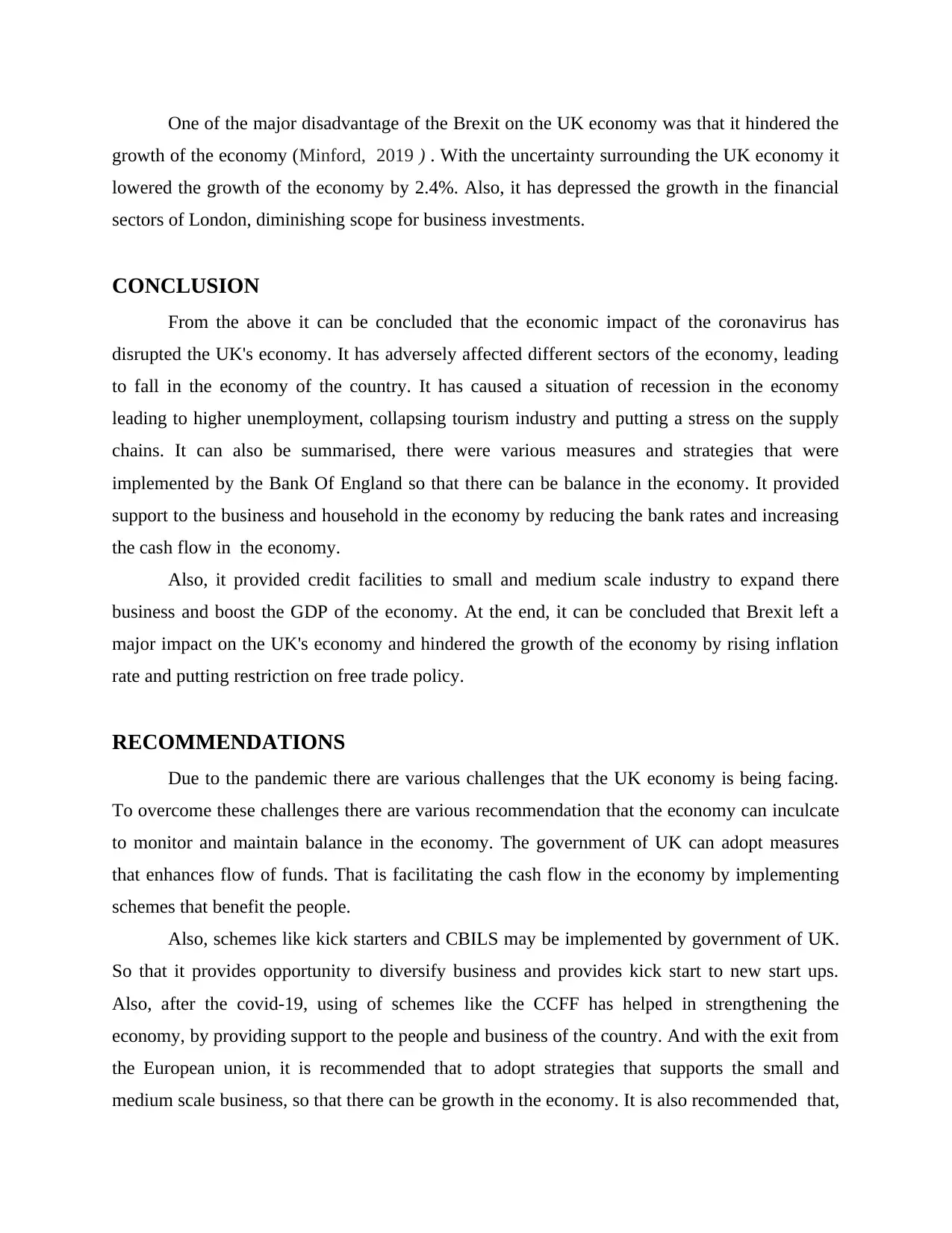
One of the major disadvantage of the Brexit on the UK economy was that it hindered the
growth of the economy (Minford, 2019 ) . With the uncertainty surrounding the UK economy it
lowered the growth of the economy by 2.4%. Also, it has depressed the growth in the financial
sectors of London, diminishing scope for business investments.
CONCLUSION
From the above it can be concluded that the economic impact of the coronavirus has
disrupted the UK's economy. It has adversely affected different sectors of the economy, leading
to fall in the economy of the country. It has caused a situation of recession in the economy
leading to higher unemployment, collapsing tourism industry and putting a stress on the supply
chains. It can also be summarised, there were various measures and strategies that were
implemented by the Bank Of England so that there can be balance in the economy. It provided
support to the business and household in the economy by reducing the bank rates and increasing
the cash flow in the economy.
Also, it provided credit facilities to small and medium scale industry to expand there
business and boost the GDP of the economy. At the end, it can be concluded that Brexit left a
major impact on the UK's economy and hindered the growth of the economy by rising inflation
rate and putting restriction on free trade policy.
RECOMMENDATIONS
Due to the pandemic there are various challenges that the UK economy is being facing.
To overcome these challenges there are various recommendation that the economy can inculcate
to monitor and maintain balance in the economy. The government of UK can adopt measures
that enhances flow of funds. That is facilitating the cash flow in the economy by implementing
schemes that benefit the people.
Also, schemes like kick starters and CBILS may be implemented by government of UK.
So that it provides opportunity to diversify business and provides kick start to new start ups.
Also, after the covid-19, using of schemes like the CCFF has helped in strengthening the
economy, by providing support to the people and business of the country. And with the exit from
the European union, it is recommended that to adopt strategies that supports the small and
medium scale business, so that there can be growth in the economy. It is also recommended that,
growth of the economy (Minford, 2019 ) . With the uncertainty surrounding the UK economy it
lowered the growth of the economy by 2.4%. Also, it has depressed the growth in the financial
sectors of London, diminishing scope for business investments.
CONCLUSION
From the above it can be concluded that the economic impact of the coronavirus has
disrupted the UK's economy. It has adversely affected different sectors of the economy, leading
to fall in the economy of the country. It has caused a situation of recession in the economy
leading to higher unemployment, collapsing tourism industry and putting a stress on the supply
chains. It can also be summarised, there were various measures and strategies that were
implemented by the Bank Of England so that there can be balance in the economy. It provided
support to the business and household in the economy by reducing the bank rates and increasing
the cash flow in the economy.
Also, it provided credit facilities to small and medium scale industry to expand there
business and boost the GDP of the economy. At the end, it can be concluded that Brexit left a
major impact on the UK's economy and hindered the growth of the economy by rising inflation
rate and putting restriction on free trade policy.
RECOMMENDATIONS
Due to the pandemic there are various challenges that the UK economy is being facing.
To overcome these challenges there are various recommendation that the economy can inculcate
to monitor and maintain balance in the economy. The government of UK can adopt measures
that enhances flow of funds. That is facilitating the cash flow in the economy by implementing
schemes that benefit the people.
Also, schemes like kick starters and CBILS may be implemented by government of UK.
So that it provides opportunity to diversify business and provides kick start to new start ups.
Also, after the covid-19, using of schemes like the CCFF has helped in strengthening the
economy, by providing support to the people and business of the country. And with the exit from
the European union, it is recommended that to adopt strategies that supports the small and
medium scale business, so that there can be growth in the economy. It is also recommended that,
⊘ This is a preview!⊘
Do you want full access?
Subscribe today to unlock all pages.

Trusted by 1+ million students worldwide

it should take guidance from the experts to frame policies that will boost the economy and
leading towards growth. And it should frame policies that increases Foreign Direct Investment in
the economy, so that there can be expansion in the investments.
leading towards growth. And it should frame policies that increases Foreign Direct Investment in
the economy, so that there can be expansion in the investments.
Paraphrase This Document
Need a fresh take? Get an instant paraphrase of this document with our AI Paraphraser
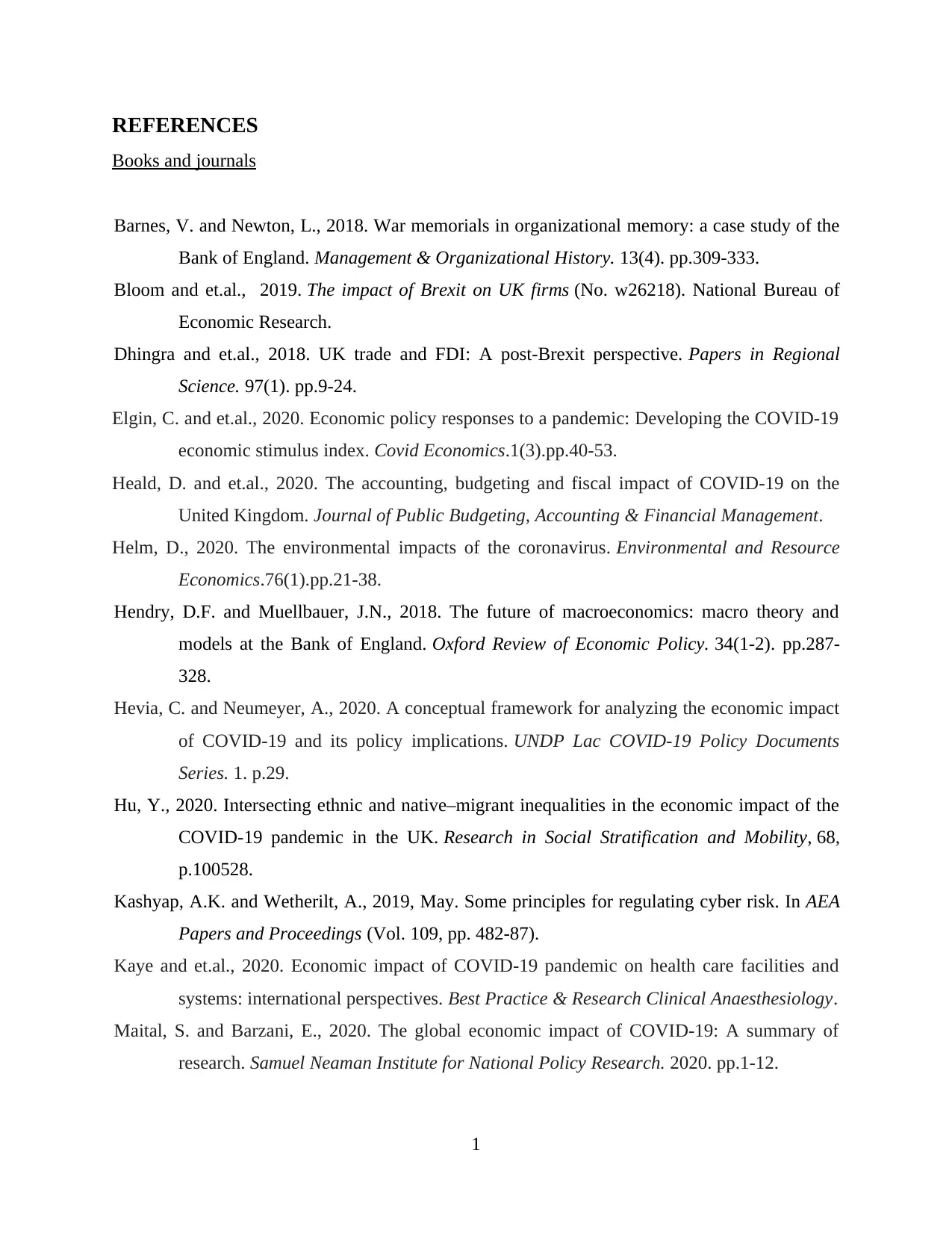
REFERENCES
Books and journals
Barnes, V. and Newton, L., 2018. War memorials in organizational memory: a case study of the
Bank of England. Management & Organizational History. 13(4). pp.309-333.
Bloom and et.al., 2019. The impact of Brexit on UK firms (No. w26218). National Bureau of
Economic Research.
Dhingra and et.al., 2018. UK trade and FDI: A post‐Brexit perspective. Papers in Regional
Science. 97(1). pp.9-24.
Elgin, C. and et.al., 2020. Economic policy responses to a pandemic: Developing the COVID-19
economic stimulus index. Covid Economics.1(3).pp.40-53.
Heald, D. and et.al., 2020. The accounting, budgeting and fiscal impact of COVID-19 on the
United Kingdom. Journal of Public Budgeting, Accounting & Financial Management.
Helm, D., 2020. The environmental impacts of the coronavirus. Environmental and Resource
Economics.76(1).pp.21-38.
Hendry, D.F. and Muellbauer, J.N., 2018. The future of macroeconomics: macro theory and
models at the Bank of England. Oxford Review of Economic Policy. 34(1-2). pp.287-
328.
Hevia, C. and Neumeyer, A., 2020. A conceptual framework for analyzing the economic impact
of COVID-19 and its policy implications. UNDP Lac COVID-19 Policy Documents
Series. 1. p.29.
Hu, Y., 2020. Intersecting ethnic and native–migrant inequalities in the economic impact of the
COVID-19 pandemic in the UK. Research in Social Stratification and Mobility, 68,
p.100528.
Kashyap, A.K. and Wetherilt, A., 2019, May. Some principles for regulating cyber risk. In AEA
Papers and Proceedings (Vol. 109, pp. 482-87).
Kaye and et.al., 2020. Economic impact of COVID-19 pandemic on health care facilities and
systems: international perspectives. Best Practice & Research Clinical Anaesthesiology.
Maital, S. and Barzani, E., 2020. The global economic impact of COVID-19: A summary of
research. Samuel Neaman Institute for National Policy Research. 2020. pp.1-12.
1
Books and journals
Barnes, V. and Newton, L., 2018. War memorials in organizational memory: a case study of the
Bank of England. Management & Organizational History. 13(4). pp.309-333.
Bloom and et.al., 2019. The impact of Brexit on UK firms (No. w26218). National Bureau of
Economic Research.
Dhingra and et.al., 2018. UK trade and FDI: A post‐Brexit perspective. Papers in Regional
Science. 97(1). pp.9-24.
Elgin, C. and et.al., 2020. Economic policy responses to a pandemic: Developing the COVID-19
economic stimulus index. Covid Economics.1(3).pp.40-53.
Heald, D. and et.al., 2020. The accounting, budgeting and fiscal impact of COVID-19 on the
United Kingdom. Journal of Public Budgeting, Accounting & Financial Management.
Helm, D., 2020. The environmental impacts of the coronavirus. Environmental and Resource
Economics.76(1).pp.21-38.
Hendry, D.F. and Muellbauer, J.N., 2018. The future of macroeconomics: macro theory and
models at the Bank of England. Oxford Review of Economic Policy. 34(1-2). pp.287-
328.
Hevia, C. and Neumeyer, A., 2020. A conceptual framework for analyzing the economic impact
of COVID-19 and its policy implications. UNDP Lac COVID-19 Policy Documents
Series. 1. p.29.
Hu, Y., 2020. Intersecting ethnic and native–migrant inequalities in the economic impact of the
COVID-19 pandemic in the UK. Research in Social Stratification and Mobility, 68,
p.100528.
Kashyap, A.K. and Wetherilt, A., 2019, May. Some principles for regulating cyber risk. In AEA
Papers and Proceedings (Vol. 109, pp. 482-87).
Kaye and et.al., 2020. Economic impact of COVID-19 pandemic on health care facilities and
systems: international perspectives. Best Practice & Research Clinical Anaesthesiology.
Maital, S. and Barzani, E., 2020. The global economic impact of COVID-19: A summary of
research. Samuel Neaman Institute for National Policy Research. 2020. pp.1-12.
1
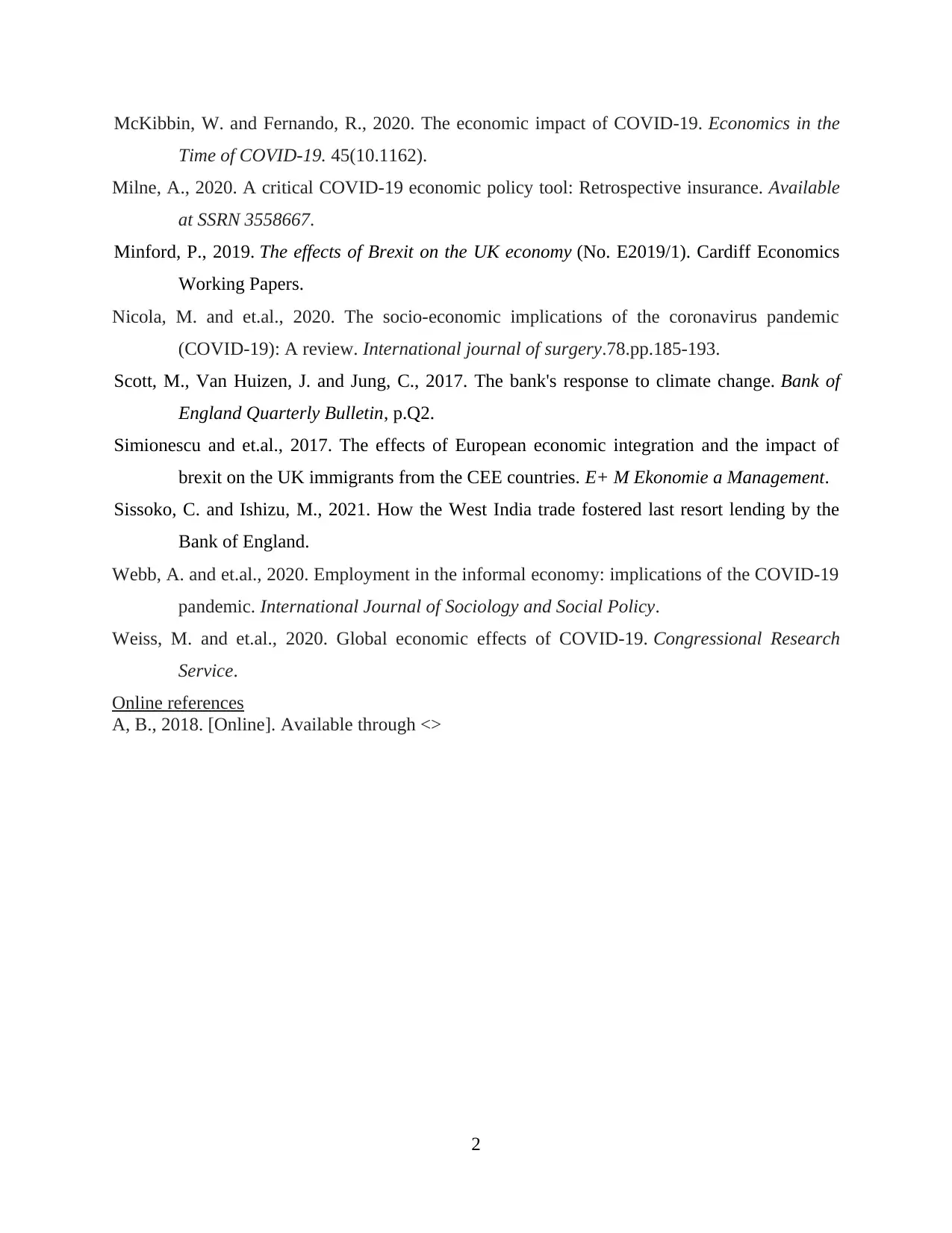
McKibbin, W. and Fernando, R., 2020. The economic impact of COVID-19. Economics in the
Time of COVID-19. 45(10.1162).
Milne, A., 2020. A critical COVID-19 economic policy tool: Retrospective insurance. Available
at SSRN 3558667.
Minford, P., 2019. The effects of Brexit on the UK economy (No. E2019/1). Cardiff Economics
Working Papers.
Nicola, M. and et.al., 2020. The socio-economic implications of the coronavirus pandemic
(COVID-19): A review. International journal of surgery.78.pp.185-193.
Scott, M., Van Huizen, J. and Jung, C., 2017. The bank's response to climate change. Bank of
England Quarterly Bulletin, p.Q2.
Simionescu and et.al., 2017. The effects of European economic integration and the impact of
brexit on the UK immigrants from the CEE countries. E+ M Ekonomie a Management.
Sissoko, C. and Ishizu, M., 2021. How the West India trade fostered last resort lending by the
Bank of England.
Webb, A. and et.al., 2020. Employment in the informal economy: implications of the COVID-19
pandemic. International Journal of Sociology and Social Policy.
Weiss, M. and et.al., 2020. Global economic effects of COVID-19. Congressional Research
Service.
Online references
A, B., 2018. [Online]. Available through <>
2
Time of COVID-19. 45(10.1162).
Milne, A., 2020. A critical COVID-19 economic policy tool: Retrospective insurance. Available
at SSRN 3558667.
Minford, P., 2019. The effects of Brexit on the UK economy (No. E2019/1). Cardiff Economics
Working Papers.
Nicola, M. and et.al., 2020. The socio-economic implications of the coronavirus pandemic
(COVID-19): A review. International journal of surgery.78.pp.185-193.
Scott, M., Van Huizen, J. and Jung, C., 2017. The bank's response to climate change. Bank of
England Quarterly Bulletin, p.Q2.
Simionescu and et.al., 2017. The effects of European economic integration and the impact of
brexit on the UK immigrants from the CEE countries. E+ M Ekonomie a Management.
Sissoko, C. and Ishizu, M., 2021. How the West India trade fostered last resort lending by the
Bank of England.
Webb, A. and et.al., 2020. Employment in the informal economy: implications of the COVID-19
pandemic. International Journal of Sociology and Social Policy.
Weiss, M. and et.al., 2020. Global economic effects of COVID-19. Congressional Research
Service.
Online references
A, B., 2018. [Online]. Available through <>
2
⊘ This is a preview!⊘
Do you want full access?
Subscribe today to unlock all pages.

Trusted by 1+ million students worldwide
1 out of 12
Related Documents
Your All-in-One AI-Powered Toolkit for Academic Success.
+13062052269
info@desklib.com
Available 24*7 on WhatsApp / Email
![[object Object]](/_next/static/media/star-bottom.7253800d.svg)
Unlock your academic potential
Copyright © 2020–2026 A2Z Services. All Rights Reserved. Developed and managed by ZUCOL.





